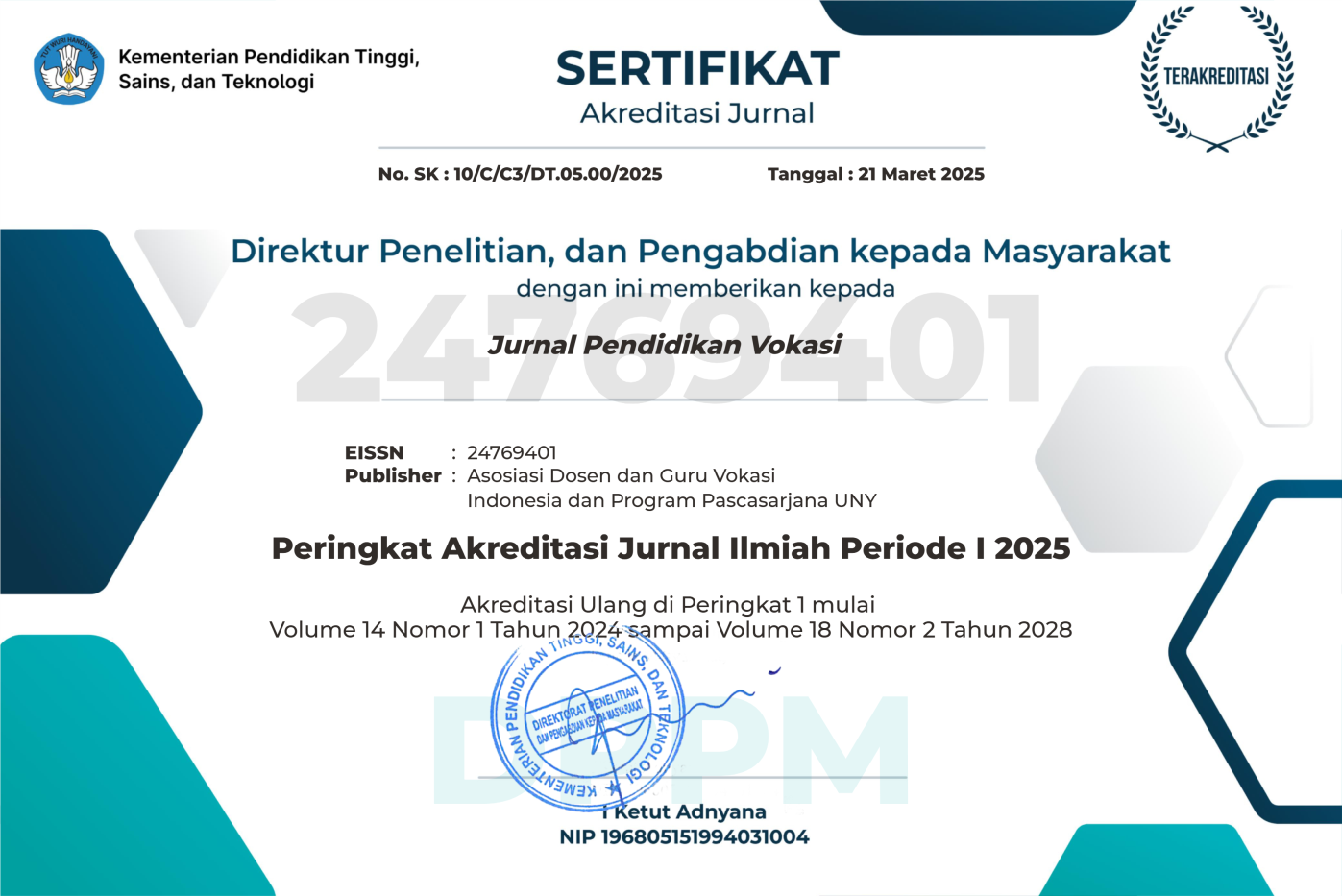Model pembelajaran karakter pelaut
DOI:
https://doi.org/10.21831/jpv.v6i3.11446Keywords:
karakter pelaut, co-prol, pertikepel, seafarers' characterAbstract
Kata kunci: karakter pelaut, co-prol, pertikepel
INSTRUCTIONAL MODEL OF SEAFARERS' CHARACTER
Abstract
The objectives of this research were to produce: (1) the description of values of seafarers' character had been developed for the students of Pertikepel; (2) the description of the values of seafarers' character required by international maritime industry; (3) the effective seafarers' character instructional model applied for the students of Pertikepel. This study used a Research and Development Model proposed by Richey & Klein. The research involved the following steps: (1) developing the model of need assessment and draft, (2) validating the internal model using FGD method and expert review, and validating the external model using quasi experimental method withone group pretest posttest design proposed by Isaac and Michael. The results of the research showed that: (1) discipline was the value of seafarers' character which had been developed for the students of Pertikepel; (2) the values of seafarers' character should be developed for the students of maritime higher education were responsibility, self confidence, work ethic, problem solving, and cooperativeness; (3) the Co–Prol model was effective since there was the development of the weekly increasing trend on the values of character, starting from first week until sixteenth week.
Keywords: seafarers' character, co-prol, pertikepelReferences
Departemen Perhubungan RI. (2000). Peraturan Pemerintah RI Nomor 7, Tahun 2000, tentang Kepelautan.
Elenora. (2009). Prespektif kebutuhan SDM pelayaran sekarang dan masa yang akan datang. Makalah disajikan dalam kuliah umum di AMY.
Gunawan, H. (2012). Pendidikan karakter konsep dan implementasi. Bandung: Alfabeta.
Hergenhahn, B. R. & Olson, M. H., (2010). Theory of learning (teori belajar). 7th Edition. Jakarta: Kencana.
Internatioal Maritime Organization (IMO). (2011). STCW convention and STCW code: London: IMO.
Isaac, S., & Michael, W.B. (1981).Handbook in research and evaluation.Second edition. San Diego, California: Edits Publisher.
Majalah Maritim. (Edisi No: 476, 23 Nopember – 3 Desember 2007). Kualitas Pendidikan maritim belum merata. Jakarta: Gamalama Media, 02.
Pemerintah Republik Indonesia. (2010). Kebijakan nasional pembangunan karakter bangsa tahun 2010 – 2025.
Pratama, W. (2010).Evaluasi implementasi QSS berbasis IMO di Akademi Maritim Yogyakarta. Laporan Penelitian. Yogyakarta: UNY.
Rahyubi, H. (2012). Teori-teori belajar dan aplikasi pembelajaran motorik diskripsi dan tinjauan kritis. Bandung: Referens.
Richey, R.C., & Klein, J.D. (2009).Design and development research. New York: Routledge
Rusmono. (2012). Strategi pembelajaran dengan problem based learning itu perlu. Bogor: Grahlia Indonesia.
Schunk, D.H. (2012). Learning theories an education prespective, translation from english language edition. Yogyakarta: Pustaka Pelajar.
Yusof, M., et.al, (2011). Cooperative Problem Based Learning: A Practical Model for a Typical Course. IEEE Global Engineering Education Conference (EDUCON), pp 366-373. Universiti Teknologi Malaysia, Johor Bahru Malaysia. Diakses tanggal 11 Maret 2015.
Zuchdi, D.,et.al, (2010). Pendidikan karakter dengan pendekatan komprehensif terintegrasi dalam perkuliahan dan pengembangan kultur universitas. Yogyakarta: UNY Press.
Downloads
Published
How to Cite
Issue
Section
Citation Check
License
The authors submitting a manuscript to this journal agree that, if accepted for publication, copyright publishing of the submission shall be assigned to Jurnal Pendidikan Vokasi. However, even though the journal asks for a copyright transfer, the authors retain (or are granted back) significant scholarly rights.
The copyright transfer agreement form can be downloaded here: [JPV Copyright Transfer Agreement Form]
The copyright form should be signed originally and sent to the Editorial Office through email to jpvokasi@uny.ac.id
Jurnal Pendidikan Vokasi by http://journal.uny.ac.id/index.php/jpv is licensed under a Creative Commons Attribution-ShareAlike 4.0 International License.












